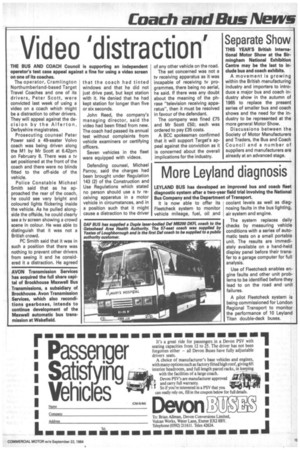Video 'distraction'
Page 21

If you've noticed an error in this article please click here to report it so we can fix it.
THE BUS AND COACH Council is operator's test case appeal against a on one of its coaches. supporting an independent fine for using a video screen The operator, Cramlington Northumberland-based Target Travel Coaches and one of its drivers, Peter Scott, were convicted last week of using a video on a coach which might be a distraction to other drivers. They will appeal against the decision by the Alferton, Derbyshire magistrates.
Prosecuting counsel Peter Power said a 49-seater Volvo coach was being driven along the M1 by Mr Scott at 6.42pm on February 8. There was a tv set positioned at the front of the coach and there were no blinds fitted to the off-side of the vehicle.
Police Constable Michael Smith said that as he approached the rear of the coach, he could see very bright and coloured lights flickering inside the vehicle. As he pulled alongside the offside, he could clearly see a tv screen showing a crowd scene in colour. He was able to distinguish that it was not a British crowd.
PC Smith said that it was in such a position that there was nothing to prevent other drivers from seeing it and he considered it a distraction. He agreed that the coach had tinted windows and that he did not just drive past, but kept station with it. He denied that he had kept station for longer than five or six seconds.
John Reed, the company's managing director, said the video had been fitted from new. The coach had passed its annual test without complaints from vehicle examiners or certifying officers.
Seven vehicles in the fleet were equipped with videos.
Defending counsel, Michael Parroy, said the charges had been brought under Regulation 143 (2) of the Construction and Use Regulations which stated no person should use a tv receiving apparatus in a motor vehicle in circumstances, and in a position such that it might cause a distraction to the driver of any other vehicle on the road.
The set concerned was not a tv receiving apparatus as it was incapable of receiving tv programmes, there being no aerial, he said. If there was any doubt about the meaning of the phrase "television receiving apparatus", then it must be resolved in favour of the defendant.
The company was fined £75 and Mr Scott £50; each was ordered to pay £35 costs.
A BCC spokesman confirmed that it will support Target's appeal against the conviction as it is concerned about the overall implications for the industry.




























































































